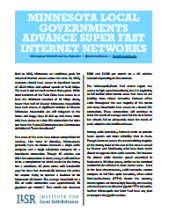
Fast, affordable Internet access for all.

Ponca City's free Wi-Fi has attracted attention over the years. A recent article in Government Technology focuses on the free Wi-Fi service and reveals the secret behind Ponca City's jewel - their municipal fiber network.
From the article:
So what makes Ponca City’s wireless network a long-term success, and what suggestions do city officials have for other areas that want to replicate it?
It all starts with fiber, said Technology Services Director Craige Baird and City Manager Craig Stephenson. But fiber’s price tag stops many local governments in their tracks, especially when they want to do it in a year instead of building a network out slowly over a number of years.
As we reported earlier this year, Pona City's wireless is supported and funded by its fiber network. The community began the incremental installation in 1997, adding more each year; the network is now over 350 miles long. Revenue from commercial customers supply the funds for the wireless mesh network.
Residents can use the basic service for free and a modest investment optimizes their access:
While the network can be accessed by wireless-enabled devices throughout the city, residents can install a Wi-Fi modem in their house to receive a stronger signal indoors. The optional modem, called a Pepwave, costs about $150 and comes set up to connect to the free public network. The city got local computer stores to stock and support the devices, and in so doing, helped those businesses.
The service has also had wider reaching benefits:
During the recent recession, the $30 to $70 per month residents had previously paid to commercial Internet service providers stayed in Ponca City, helping “churn the economy,” Stephenson said.
In addition, Stephenson and Baird cited the network as a huge benefit to the schools and career technology center to help train and keep students in the area for economic development. Eighth-graders up through high school have electronic textbooks, laptops or notebooks, said Stephenson, “and that was only possible because everyone inside the city limits has Internet access.”
In the most recent podcast from Community Matters, Fran Stoddard interviews Chris Mitchell and Billy Ray, from the Glasgow Electric Plant Board. The interview touches on the benefits of community networks, their critical role in the health of local communities, and provides info on getting a local initiative started.
Glasgow, the first municipal network in the country, pioneered the idea of the publicly owned broadband network. Billy Ray, Superintendent of Glasgow's Electric Plant Board shared a detailed account of the community's strategy in episode 74 of the Community Broadband Bits podcast. He also helped us to develop a video on the network (soon to be released!).
Community Matters also provides notes from the show, detailing questions and answers. The show runs just under an hour.
The Iowa Association of Municipal Utilities is presenting the 2014 IAMU Broadband Conference on March 26 - 27. The event will be held at the Ramada Tropics and Resort Center in downtown Des Moines. (Psst! Take your swimsuit - there is a water park in the Resort Center!)
Christopher Mitchell will be presenting on March 26 along with Craig Settles at 10:15 a.m. Central. The discussion will focus on economic impacts of broadband. Check out the schedule to see the broad range of topics, speakers, and vendors.
You can register online or contact Curtis Dean at IAMU for more info on the event.

Community leaders in Lexington are the latest to stand at a fork in the broadband road. In September, the franchise agreement between the Lexington-Fayette Urban County Government (LFUCG) and Time Warner Cable expired, resulting in a month-to-month agreement continuation. As they negotiate a new contract, local citizens have called for consideration of a municipal network.
When the contract was originally negotiated in the 1990s, the community was primarily interested in cable TV servce. As broadband has become critical infrastructure for residents, businesses, and government, the community's focus shifted. Lexington customers have complained repeatedly about Internet and cable TV service from Time Warner Cable. A February Kentucky.com article noted that local consumers complained over 300 times to Lexington's Urban County Government, the entity responsible for contract negotiations. According to the article:
The biggest single category of complaints was about price and the volatility of monthly rates. Other complaints were that the cable TV service "repeatedly fails, resets or freezes"; that there was an extended wait time and/or "unhelpful responses" in customer service; and that email and Internet "had declined in service" and showed "significantly slower service."
The City Council considered the situation bad enough to debate whether or not to appoint an ombudsman to advocate for Lexington consumers.
The community wonders how the proposed merger between Time Warner Cable and Comcast will impact their current service. While the Vice Mayor seems to think it is an "almost golden opportunity" to deal with a different provider, local citizen Roy M. Cornett has a different perspective. He wrote for Business Lexington.com:
This post got lost in our system but we still wanted to publish it. The Nation ran an article by Maya Wiley, founder of the Center for Social Inclusion, calling on New York's Mayor de Blasio to bring the "Two New Yorks" together with community broadband.
Her article describes the Red Hook area of Brooklyn where a community network is helping residents and businesses. The community is filled with low-income families and physically separated by the subway system. During Superstorm Sandy, Red Hook happened to be one of the few places where one could find Wi-Fi access in New York.
Thanks to the the Red Hook Initiative (RHI), the Open Technology Institute (OTI), and a strong sense of self-reliance, the community established a mesh network. Wiley shares the story of the community network, describing ways it has provided access and created opportunity. She understands the link between community networks and possibilities for the people they serve.
From the article:
New York is getting a big infusion of federal dollars to rebuild after Hurricane Sandy. Mayor de Blasio should look for ways to leverage some of those dollars to better equip low-lying, low-income communities to weather the roiling seas of climate change and the economy.
High-speed Internet access won’t stop future superstorms and it won’t solve all the unfairness that low-income New Yorkers face. But with strong alliances between community members, local non-profits, businesses and technology experts, it will bring affordable, local innovation that helps us build stronger, fairer and more resilient communities.
In the time since, Maya Wiley has accepted a position as Counsel to Mayor de Blasio and will be heading up efforts to expand Internet access among other duties.
We recently reported that local leaders in Chanute and Westminster had passed resolutions supporting the FCC as it considers its authority. The Kentucky Municipal Utilities Association (KMUA) passed a similar resolution on February 28th.
KMUA members include 45 city-owned utilities including electricity, water, wastewater, natural gas, and telecommunications services. Members include places our readers are familiar with - Franklin, Glasgow, and Russellville - in addition to a lengthy list of other Kentucky communities.
The KMUA is publicly offering its support to the recent court decision finding that the FCC has the authority to remove or prevent state barriers.
The resolution reflects one of the KMUA credos, as listed on their website:
KMUA opposes any action, legislative or administrative, which would curb, limit, or remove local control of the operations of municipal utilities from their citizen owners.
We expect to see more resolutions like this as communities decide to go on record. The language is very similar to the Chanute and Westminster resolutions. We have made the document available below.
The Government Accountability Office released a report today examining economic development and government-spurred broadband deployment. The report, titled Telecommunications: Federal Broadband Deployment Programs and Small Business looks at the effects of stimulus projects on opportunities for small business.
According to the press release:
“GAO’s investigation confirms the success of the Recovery Act’s broadband programs," said Rep. Waxman. “In rural and urban areas across the country, small businesses are benefitting from higher speeds and lower prices thanks to federal investment in this essential infrastructure. Expanding broadband access and quality is critical for American competiveness in the 21st century global economy. These were public dollars well spent.”
The report reviews communities around the country where either federal dollars have been invested in networks or local governments have made such investments. The results were consistent with our findings over the years - municipal networks create a business-friendly environment and contribute to economic development.
According to the report summary:
According to small businesses GAO met with, the speed and reliability of their broadband service improved after they began using federally funded or municipal networks.
Regarding competition, the GAO find that municipal networks spur competitor investments:
For example, following the construction of a fiber-to-the-home municipal network in Monticello, Minnesota, the two other broadband providers in the area made investments in their infrastructure to improve their broadband speeds. One of these providers stated that all of its networks undergo periodic upgrades to improve service, but upgrade schedules can change in order to stay competitive when there is a new service provider in a particular market.
The possible merger between Comcast and Time Warner Cable and the FCC's recent announcement to review state barriers have created a significant buzz in the world of telecommunications. Two recent NPR interviews with Susan Crawford and Jim Baller provide insight into how the merger may affect consumers and why a new light is shining on municipal networks.
Crawford spoke with Brooke Gladstone for a recent interview for On the Media. The two addressed some of the consequences of the potential merger. Crawford also discussed the option of municipal broadband investment is an alternative gaining traction. As our readers know, Crawford authored Captive Audience: The Telecom Industry and Monopoly Power in the New Gilded Age. Crawford joined us in a past episode of the Communiy Broadband Bits podcast.
Jim Baller, President of the Baller Herbst Law Group, also joined On the Media when he spoke with Bob Garfield. Baller and Garfield talked about the cable and telecom lobby's efforts to block municipal authority to build networks. Baller supplied a few of the many examples of successful communities that have blossomed as a result of their investment. We have interviewed Baller three times for our podcast.
Each interview is a little over six minutes.
 "We had to choose an area that could offer a low cost of doing business, while delivering an infrastructure better than that of other states and countries," wrote Mr. Kalinoski, a three-time, award nominee for his special effects contributions to Black Swan and LOST, the Final Season.
"We had to choose an area that could offer a low cost of doing business, while delivering an infrastructure better than that of other states and countries," wrote Mr. Kalinoski, a three-time, award nominee for his special effects contributions to Black Swan and LOST, the Final Season.